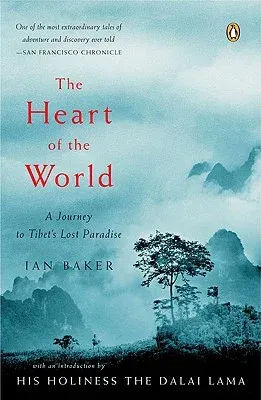The myth of Shangri-la originates in Tibetan Buddhist beliefs in
beyul, or hidden lands, sacred sanctuaries that reveal themselves to
devout pilgrims and in times of crisis. The more remote and inaccessible
the beyul, the vaster its reputed qualities. Ancient Tibetan
prophecies declare that the greatest of all hidden lands lies at the
heart of the forbidding Tsangpo Gorge, deep in the Himalayas and veiled
by a colossal waterfall. Nineteenth-century accounts of this fabled
waterfall inspired a series of ill-fated European expeditions that ended
prematurely in 1925 when the intrepid British plant collector Frank
Kingdon-Ward penetrated all but a five-mile section of the Tsangpo's
innermost gorge and declared that the falls were no more than a
"religious myth" and a "romance of geography."
The heart of the Tsangpo Gorge remained a blank spot on the map of world
exploration until world-class climber and Buddhist scholar Ian Baker
delved into the legends. Whatever cryptic Tibetan scrolls or past
explorers had said about the Tsangpo's innermost gorge, Baker
determined, could be verified only by exploring the uncharted five-mile
gap. After several years of encountering sheer cliffs, maelstroms of
impassable white water, and dense leech-infested jungles, on the last of
a series of extraordinary expeditions, Baker and his National
Geographic-sponsored team reached the depths of the Tsangpo Gorge. They
made news worldwide by finding there a 108-foot-high waterfall, the
legendary grail of Western explorers and Tibetan seekers alike.
The Heart of the World is one of the most captivating stories of
exploration and discovery in recent memory--an extraordinary journey to
one of the wildest and most inaccessible places on earth and a
pilgrimage to the heart of the Tibetan Buddhist faith.

